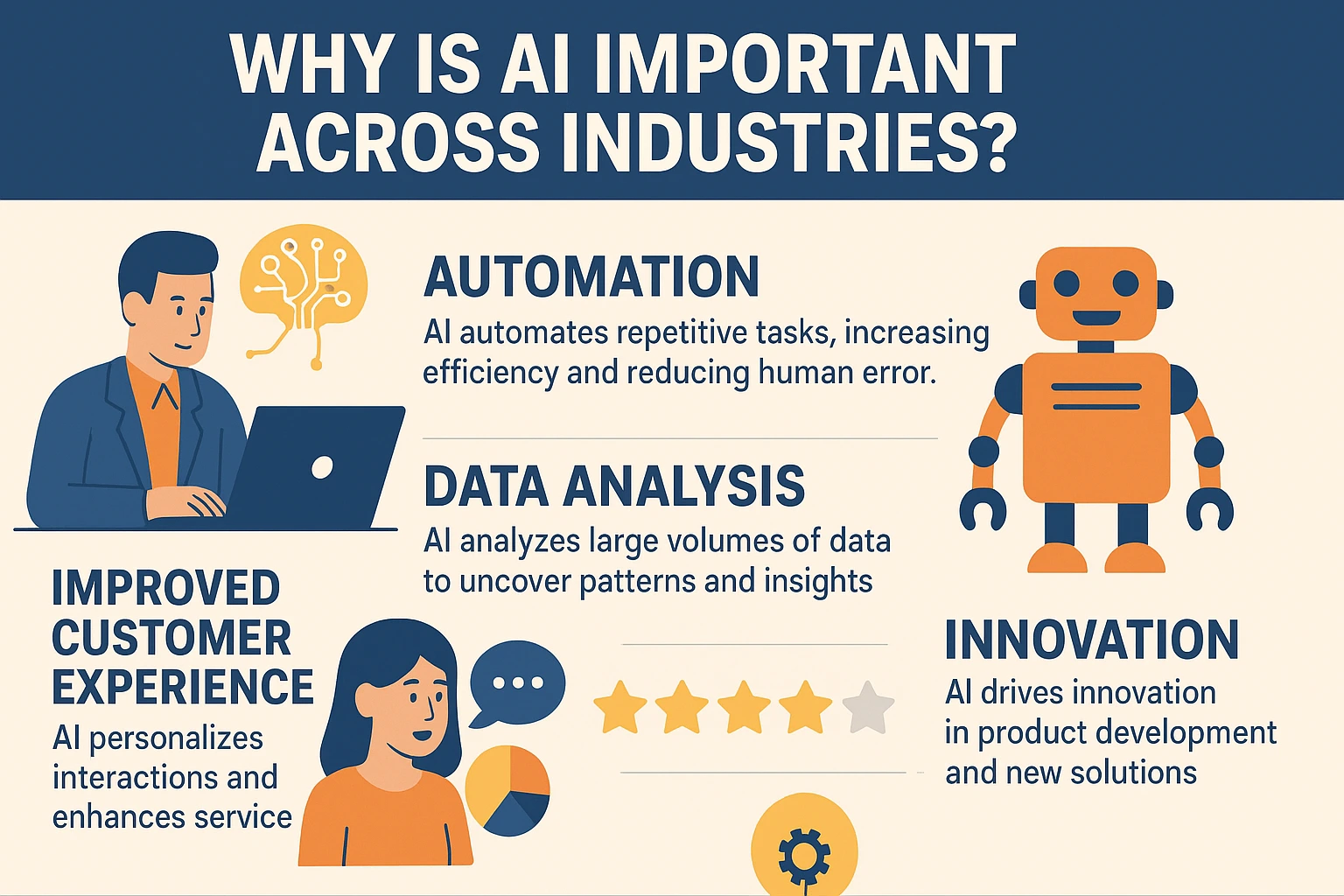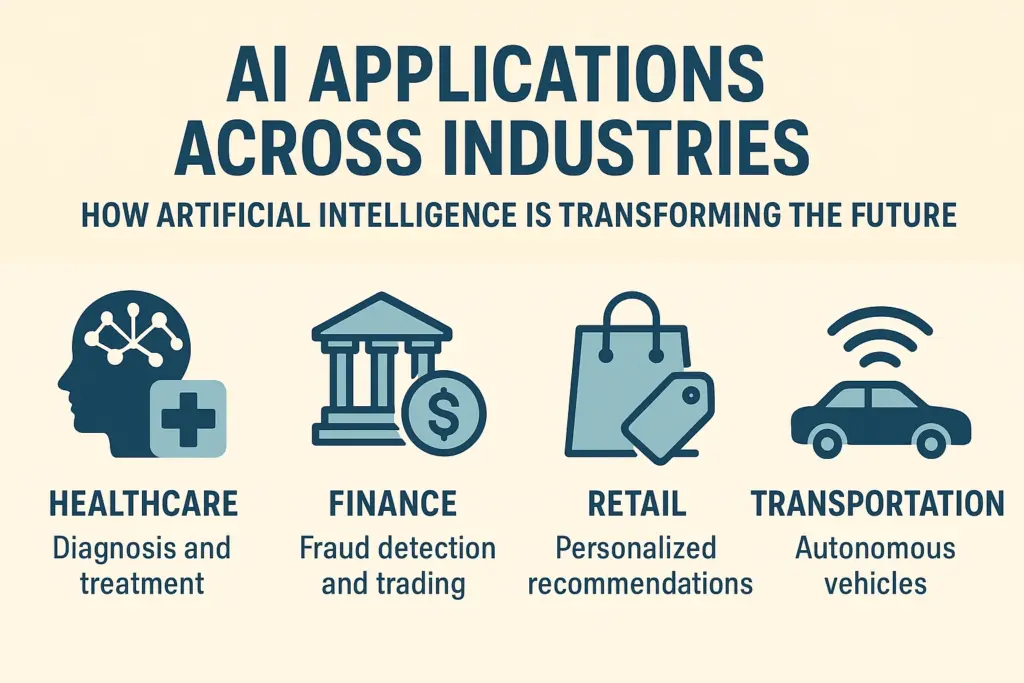Introduction
Artificial Intelligence (AI) has shifted from being a futuristic concept to becoming a daily driver of innovation. In 2025, AI applications are visible everywhere—from healthcare and banking to education, manufacturing, and even agriculture.
Businesses and individuals are embracing AI to save time, reduce costs, improve efficiency, and unlock new opportunities. This blog explores AI applications across industries, highlighting real-world use cases, benefits, and challenges.
Why is Artificial Intelligence Important Across Industries?

AI is a universal enabler because it adapts to multiple needs. Whether it’s analyzing financial data, diagnosing diseases, optimizing supply chains, or personalizing shopping experiences, AI delivers value by:
- Automating repetitive tasks
- Reducing human errors
- Processing massive data quickly
- Offering predictive insights
- Enhancing customer experiences
In short, AI is not industry-specific—it’s industry-transformative.
AI in Healthcare
Healthcare is one of the biggest beneficiaries of AI innovation.
Applications:
- Medical Imaging & Diagnosis: AI scans X-rays, MRIs, and CT scans with higher accuracy.
- Drug Discovery: Reduces the time needed to find new medicines.
- Virtual Health Assistants: Chatbots that answer patient queries 24/7.
- Predictive Analytics: Helps identify health risks and chronic disease patterns.
Real Example:
IBM Watson Health and Google’s DeepMind have been used for cancer detection and early diagnosis.
Impact: Faster diagnosis, reduced costs, and improved patient care.
Artificial Intelligence in Finance & Banking
Financial services rely on speed, accuracy, and security—areas where AI excels.
Applications:
- Fraud Detection: AI identifies unusual transactions in real time.
- Credit Scoring: AI evaluates a person’s ability to repay loans using alternative data.
- Algorithmic Trading: AI predicts market trends for investment decisions.
- Customer Support: Banking chatbots handle customer queries instantly.
Real Example:
JP Morgan uses AI for fraud prevention, while PayPal applies it for risk management.
Impact: Enhanced security, personalized services, and efficient banking.
Artificial Intelligence in Retail & E-commerce
Retailers use AI to personalize shopping experiences and optimize operations.
Applications:
- Recommendation Engines: Amazon and Netflix suggest products or shows based on user behavior.
- Inventory Management: AI predicts stock requirements to prevent shortages.
- Dynamic Pricing: AI adjusts product prices in real-time based on demand.
- Virtual Shopping Assistants: AI chatbots help customers find products quickly.
Real Example:
Walmart uses AI to manage inventory and analyze customer buying patterns.
Impact: Improved sales, customer satisfaction, and reduced wastage.
Artificial Intelligence in Education
AI is changing the way students learn and teachers teach.
Applications:
- Personalized Learning: Adaptive learning platforms adjust to student needs.
- AI Tutors: Virtual assistants help students with homework.
- Administrative Automation: Reduces teachers’ workload in grading and scheduling.
- Language Translation: Helps global learners overcome barriers.
Real Example:
Duolingo uses AI for personalized language learning.
Impact: Smarter classrooms and accessible education for all.
Artificial Intelligence in Manufacturing
Manufacturers benefit from AI by making processes smarter and safer.
Applications:
- Predictive Maintenance: AI predicts equipment failures before they happen.
- Robotics: AI-driven robots improve speed and precision.
- Quality Control: Identifies defects in products using computer vision.
- Supply Chain Optimization: AI predicts demand and manages logistics.
Real Example:
Siemens uses AI to enhance factory productivity.
Impact: Reduced downtime, lower costs, and improved product quality.
Artificial Intelligence in Agriculture
AI plays a major role in addressing global food challenges.
Applications:
- Smart Irrigation Systems: AI optimizes water usage.
- Crop Monitoring: Drones powered by AI detect crop health issues.
- Yield Prediction: AI models forecast harvest outcomes.
- Weed Detection: AI robots identify and remove weeds without chemicals.
Real Example:
John Deere uses AI-powered farming equipment for precision agriculture.
Impact: Higher crop yields, sustainable farming, and reduced costs.
AI in Transportation & Logistics
AI is revolutionizing mobility and logistics efficiency.
Applications:
- Self-Driving Cars: Companies like Tesla and Waymo lead in autonomous vehicles.
- Route Optimization: AI finds the fastest delivery routes.
- Fleet Management: Monitors vehicle conditions and driver performance.
- Predictive Traffic Systems: Reduces congestion in smart cities.
Real Example:
Uber uses AI for ride-matching and pricing.
Impact: Reduced delivery times, safer roads, and cost-efficient logistics.
AI in Entertainment & Media
Entertainment is one of the industries most visibly impacted by AI.
Applications:
- Content Creation: AI tools write scripts, generate music, and edit videos.
- Streaming Recommendations: Netflix, Spotify, and YouTube use AI extensively.
- Deepfake Technology: Creates hyper-realistic visual effects.
- Audience Analysis: AI predicts what kind of content will succeed.
Real Example:
Netflix’s recommendation engine is powered by AI, contributing to 80% of viewed content.
Impact: Personalized entertainment and faster content production.
AI in Real Estate
AI is helping both property buyers and sellers make smarter decisions.
Applications:
Property Valuation: AI calculates accurate property prices.
Virtual Tours: AI creates 3D walkthroughs of properties.
Chatbots: Answer buyer questions instantly.
Market Analysis: Predicts housing trends and demand.
Real Example:
Zillow uses AI to provide instant property value estimates.
Impact: Faster transactions and better investment decisions.
AI in Energy Sector
The energy industry is using AI to optimize resources and build sustainability.
Applications:
- Smart Grids: AI balances electricity supply and demand.
- Predictive Maintenance: Ensures smooth power plant operations.
- Renewable Energy Forecasting: AI predicts wind or solar output.
- Energy Efficiency: Smart homes use AI to save power.
Real Example:
Google uses AI to reduce energy usage in data centers by 40%.
Impact: Lower costs, reduced carbon footprint, and improved sustainability.
AI in Cybersecurity
As cyberattacks grow, AI provides advanced protection.
Applications:
- Threat Detection: AI identifies unusual patterns.
- Fraud Prevention: Monitors transactions for suspicious activity.
- User Authentication: Uses biometrics and behavioral AI.
- Incident Response: AI reacts instantly to threats.
Real Example:
Darktrace uses AI for autonomous cybersecurity defense.
Impact: Stronger security and reduced risk of data breaches.
Benefits of AI Across Industries
- Efficiency: Automates tasks faster than humans.
- Cost Reduction: Cuts operational expenses.
- Personalization: Tailors services to user needs.
- Scalability: Handles growing data volumes easily.
- Innovation: Enables new products and services.
Challenges of AI Adoption
- High Implementation Costs
- Data Privacy Concerns
- Job Displacement Risks
- Bias in Algorithms
- Regulatory Uncertainty
FAQs
Q1: How is AI used in healthcare?
Q2: How is Artificial Intelligence applied in banking?
Q3: Which industries use AI the most?
Q4: Can AI replace human jobs?
Q5: What is the future of AI in industries?
Final Thoughts
AI is not limited to one sector—it is everywhere. From diagnosing diseases to predicting crop yields and personalizing shopping experiences, AI is redefining how industries function.
While challenges like ethics and job displacement exist, the opportunities AI creates far outweigh the risks. The real competitive advantage for 2025 and beyond will be how effectively industries and individuals use AI.
SEO Metadata
- Meta Title: AI Applications Across Industries in 2025 | Real-World Use Cases
- Meta Description: Explore how AI is transforming industries in 2025. Learn about AI applications in healthcare, finance, education, manufacturing, retail, agriculture, and more.
- Keywords: AI applications, AI in industries, AI in healthcare, AI in finance, AI in retail, AI in manufacturing, AI in education, AI in agriculture, AI in transportation, AI in entertainment, AI in cybersecurity
